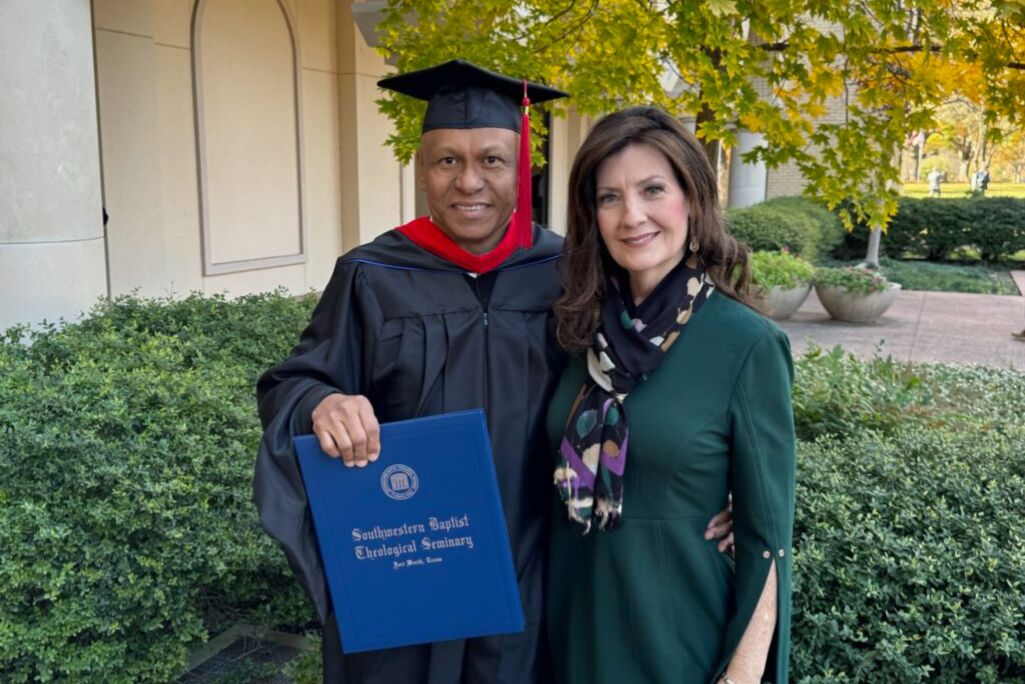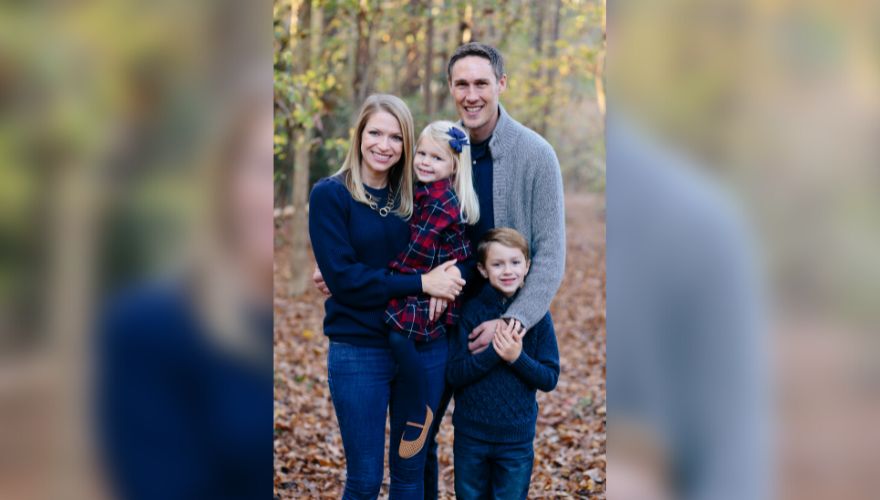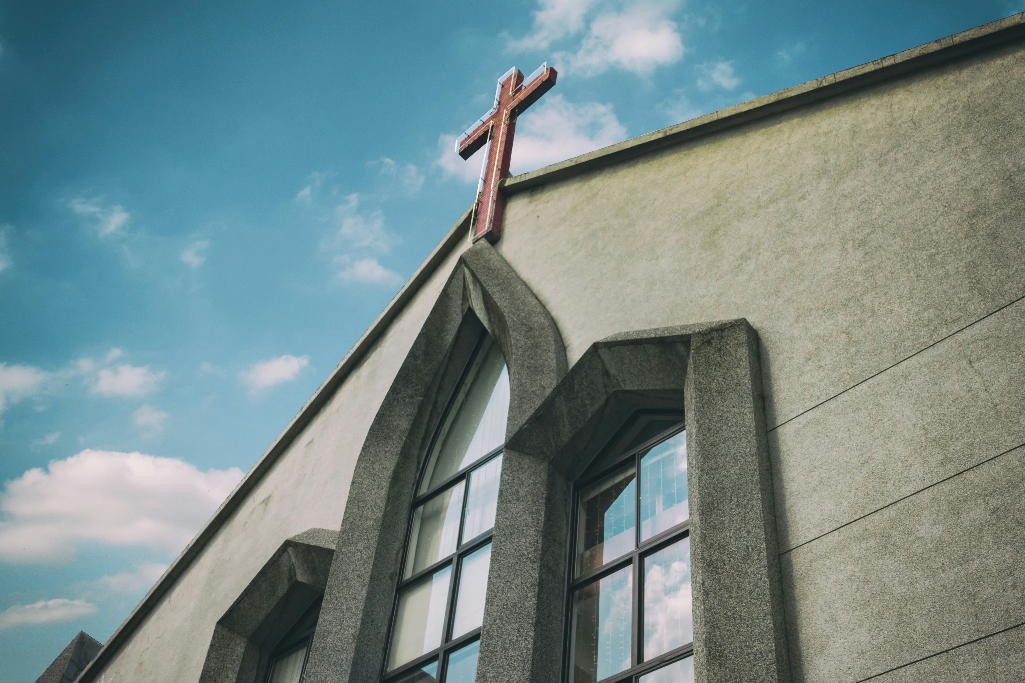
Henry Garcia graduated this December with a Master's degree in Theological Studies from SWBTS. His wife Evie stands with him.
HUNTINGTON, W. Va. (BP) — Henry Garcia had no desire to leave his native Colombia. The college-educated and seminary-trained Christian leader was responsible over 20 years for more than 30 church plants in Colombia, Costa Rica and Peru, and for the development of most of the pastors serving the ever-multiplying plants.
But then, “God put the United States in my heart,” Garcia said. “I asked God, ‘I want to go to the United States to plant churches and learn English.’ Two weeks later I received a message from the U.S.: ‘Do you want to come to West Virginia to plant churches in Spanish and have an opportunity to learn English?’
“God answered my prayer! I stopped praying and said yes,” Garcia told Baptist Press in fluent if somewhat accented English. “God connects everything.”
That was in February 2014. Five pastors in the tri-state area of West Virginia, Ohio and Kentucky who wanted to begin a Spanish-speaking ministry had heard of Garcia’s church planting success. They saw the need but none of them knew how to reach Hispanic people hiding almost in plain sight of the dominant English-speaking culture.
“They told me, ‘We don’t how to plant Hispanic churches; that’s the reason we brought you here, but we want to help you,’” Garcia said. “This was a new experience for me, this context and the help it requires. This is why we pray to God for team members, for support and for help.”
The tri-state area located in the Appalachian Plateau is mostly small towns down mountain roads. The Hispanic church planter was lent a Jeep Cherokee and several other vehicles to use for the ministry before being given a Toyota Edge.
“I follow Jesus’ example, looking for people, listening for people who speak Spanish,” Garcia said. “This state — West Virginia — and the tri-state area is very different contextually from other places in the U.S. with Spanish-speakers. Not so many people here, but from more varied countries.”
Soon after he arrived in Huntington, W.Va., which turned out to be a strategic location for ministry among Hispanics throughout the tri-state area, Garcia met Evelyn “Evie” Davis, now a cardiovascular medicine department administrator and then a member of the missions committee, worship arts team and choir at River Cities Community Church.
A single missionary set for departure to a former Soviet Union nation, she nonetheless agreed to sing for a Christmas program Garcia led because she had learned to sing in Spanish when serving a Spanish-speaking church as a pianist while living in Annapolis, Md.
Both quickly realized God had brought them together. They entered a traditional — family to family — courtship that grew into marriage in February 2016, canceling her plans for Kazakhstan though in the future their ministry might include missions outreach as God allows, Evie Garcia told Baptist Press.
“Pastor Henry learned the people and their cultures,” she said. “He might have a dozen people at a Bible study, with two from Venezuela, two from Mexico, four from Colombia, three from Honduras and one from Ecuador, for example.”
Garcia said he realized he needed to change from his typical methods of starting churches because the Spanish-speakers he met included people from professional backgrounds — physicians, attorneys, business leaders, people usually with stable families — as well as the more transient restaurant workers, landscapers and others in service industries, both documented and undocumented.
“I prayed, ‘Lord, I need you God to give me instructions and wisdom for what is the best strategy,” Garcia said. The word “pie” (pronounced “pee-eh”) — which means “foot” in Spanish — came to his mind: “‘Planting Iglesias [churches] Extraordinaria,’” [PIE] as in, “How beautiful on the mountains are the feet of those who bring good news” (Isaiah 52.7).
Garcia held the first service of Iglesia Hay Esperanza — There is Hope Church — in Huntington in October 2014. Since then, he has started Spanish-speaking churches in Ashland, Ky., in 2022; Cross Lanes, WVa., in 2023; Beckley, WVa., in September 2024; and in 2025 plans to start work in Lewisburg, WVa.
The concentration in West Virginia is because the Spanish-speaking population in West Virginia has increased by 167% since 2020 and is expected to double within three years, West Virginia Convention of Southern Baptists Executive Director Eric Ramsey told messengers at the state convention’s early November annual meeting.
There were no Spanish-speaking churches in West Virginia before Garcia’s arrival.
The reason for the Hispanic influx, Garcia believes, is the relative low cost of living and the rise of companies moving into the area who need employees.
The church planter’s strategy is to build relationships, such as by playing soccer or volleyball after 10 p.m. Sunday evenings, which is the only time restaurant workers are not working; meeting up for lunch with a college professor; or just walking the streets and past stores, listening for the sound of Spanish-speaking voices.
Another way is to provide a meal after services. This might put a landscaper at the same table with a businessman, where they talk as equals. The mealtimes (which routinely last longer than the 90-minute worship services) often attract people who do not attend services, people eager for conversation in their heart language.
“We pray for God to give us wisdom to integrate the different cultures in our churches,” Garcia said. “We need to pray these people out of hiding. Documented and undocumented, they all need Jesus.”
The church planter spoke of a man from Mexico resistant for months to his invitations to church services. “There was a moment when ‘I think I am wasting my time with him,’ but one day he was in the church and continued coming every Sunday,” Garcia said. “Every Sunday he would have a question about the Bible.
“He was discovering many things from the Bible when he was alone in his life and one day told me he was going back to Mexico to get his documentation to be able to stay in the United States,” Garcia said. “Now he is a pastor in Mexico.”
Garcia made friends with another man who in time left the area for Wisconsin, where he died. The only thing in his wallet was Garcia’s business card.
‘Finally the fruit is coming’
After the COVID pandemic, Garcia started a twice-monthly free medical clinic still in operation for Spanish-speakers, staffed by Christian physicians who are bilingual.
Project Eliana is planned to start in 2025 as a pro-life center for Spanish-speakers. There also is a need for a classroom setting for the residency training of pastors and church planters, as well as a home for church planters and missionaries who move to the area to help reach Hispanics.
The Garcias recently purchased a building on a large corner property where they plan to house all three endeavors: Project Eliana, training center and missionary home. There is a need for renovations and expansion of the three-bedroom, two-bathroom residence on the expansive property.
“This was a faith act,” Garcia said. “We are asking God to provide the team members, the financial and prayer support, and the help to do the work He has called us to do.”
Garcia remains committed also to the work in Colombia, where his workers minister each week to about 60 youngsters from the poorest neighborhoods in Medellin, by providing food and Bible instruction. Mission teams, both Spanish- and English-speaking, from the tri-state area assist at least once a year.
“We have people in different stages of the [training] process,” Garcia said. “Many years ago I am training people, and now have people ready to serve, and also new people at the same time. I ask God to provide for workers.”
A couple is coming in March from Costa Rica to start in a residency program with Garcia.
“Pastor Henry needed to shift his strategies many times because of what was going on and what we were learning, and now, just now, finally the fruit is coming,” Evie Garcia said. “It’s a beautiful thing the Lord is doing.”
(EDITOR’S NOTE — Karen L. Willoughby is a national correspondent for Baptist Press.)


